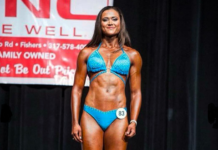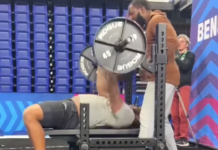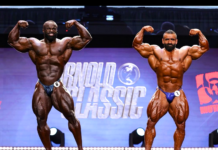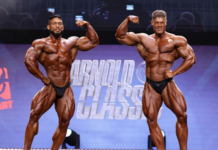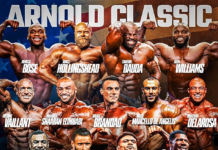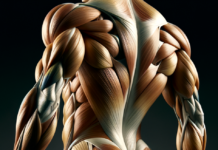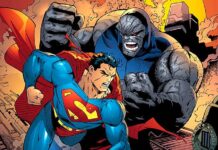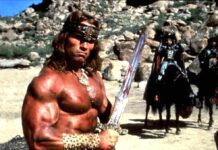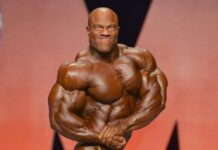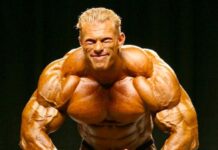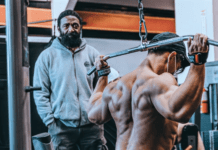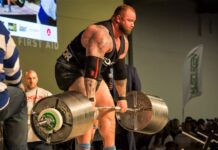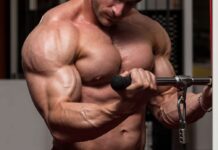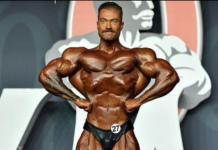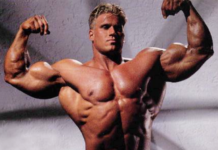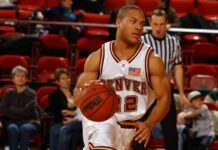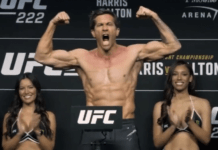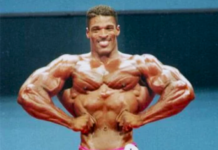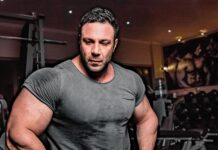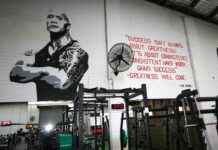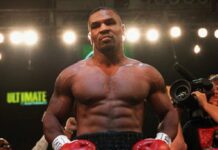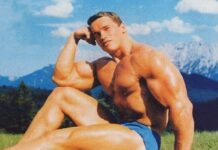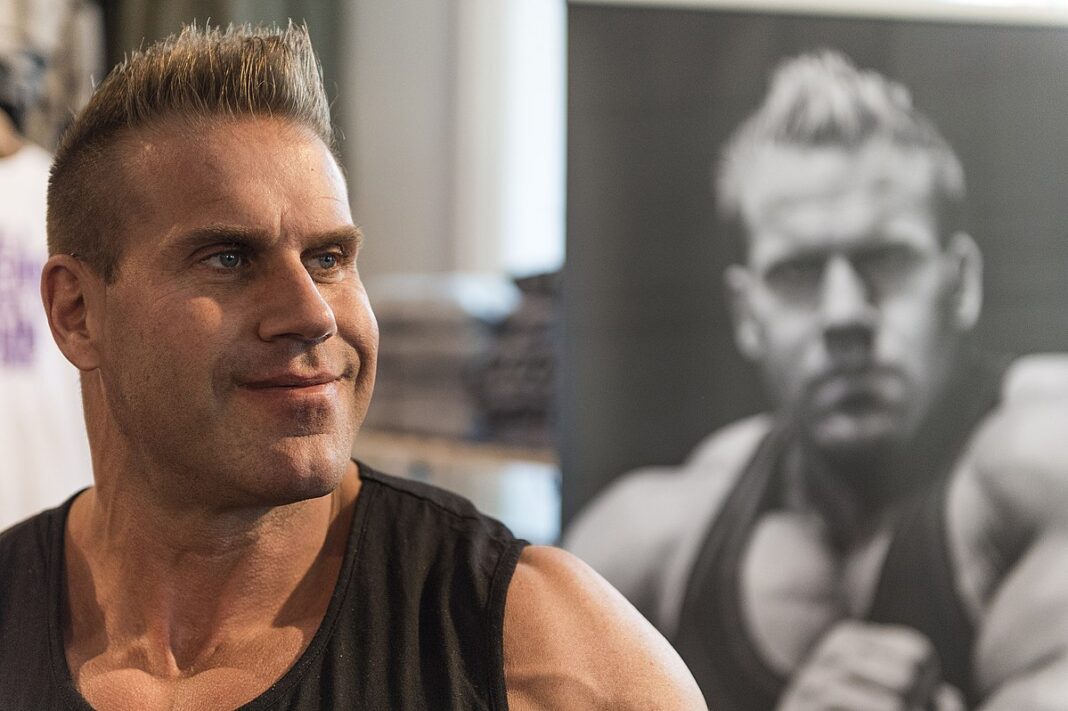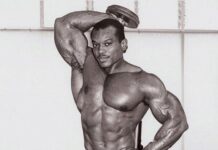Morten Skovgaard / Wikimedia Commons
For The Barbell’s first interview, I turned to a friend of nearly 20 years, the living legend, four-time Mr. Olympia, six-time Mr. Olympia runner-up, and three-time Arnold Classic champ, Jay Cutler. We chatted by phone, but most of our previous conversations were face-to-face in gyms, restaurants, and backstage at the most prestigious bodybuilding contests. Last decade, working for Flex, I trekked to Vegas each summer with photographer Kevin Horton to watch Cutler train for yet another Olympia, and the three of us traveled throughout Europe twice on post-Olympia tours. For a few days, Jay and I even stayed together in the same weirdly empty Amsterdam “safe house,” five years before its owner, the Joe Weider of the Netherlands, was murdered by hitmen (that amazing story I’ll tell here one day). Jay Cutler is one of my favorite interview subjects, not because he spills juicy anecdotes, but because he’s so unfailingly accommodating, just as he is to his millions of fans. The 12th Mr. Olympia makes sure the questioner gets something fresh from even the thousandth time he’s asked about his arm routine. And that’s why what I intended to be a quick Q&A, just five questions, turned into an hour-long discourse on goals, legacies, superstars, social media, mortality, and so much more.
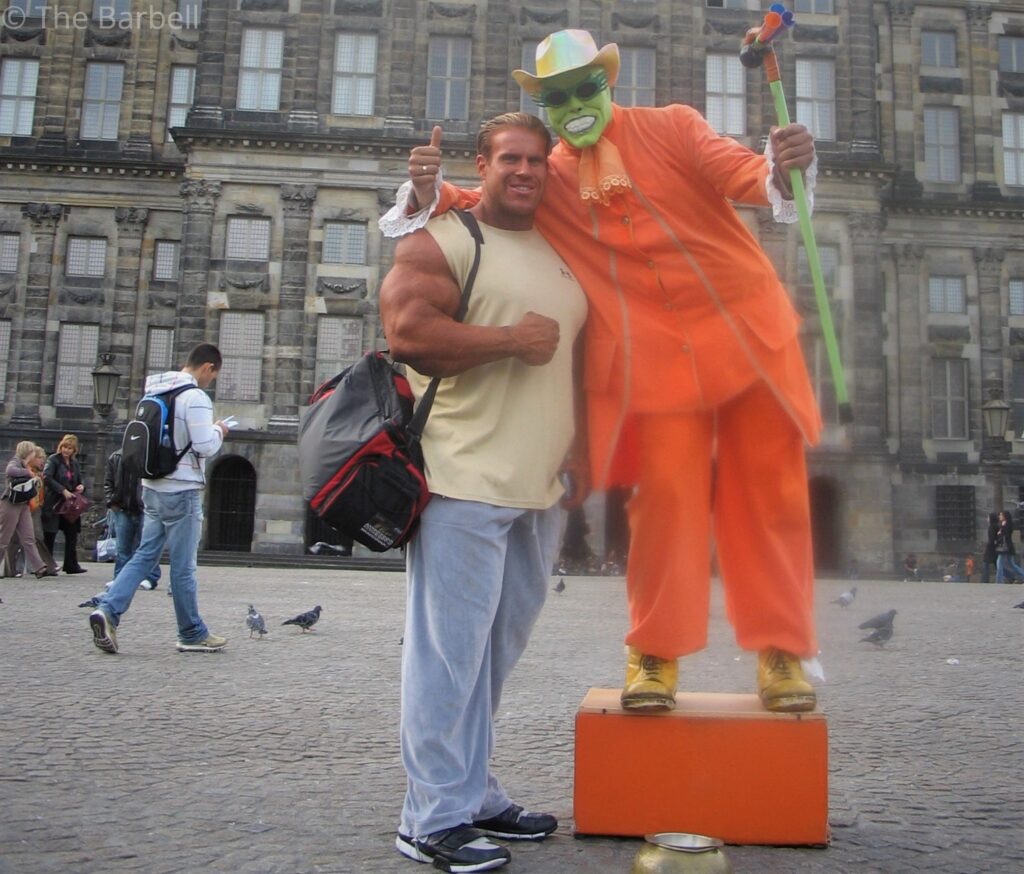
You earned a pro card at 23 and now you’re 46, so a half a lifetime has passed. If you could go back in time to 1996, what would you tell the 23-year-old you?
When my pro career began, I never planned on being Mr. Olympia. I took steps to get there, and then ’01 came along [he was a close second in the 2001 Mr. Olympia], and I was like, okay, this is at my fingertips, right? I realized that I wanted to set a legacy of success, and that was success in all arenas. People can be great bodybuilders, but you have to think of what the future brings and what you want your legacy to be. And you have to think about staying healthy long-term. We’ve seen a lot of bodybuilders in poor health and, unfortunately, too many have passed away too young, because of wrong decisions on how to take care of themselves and pace themselves.
There are no shortcuts to success. That’s my motto. You can’t climb immediately to the top. You take steps and you choose steps wisely. And you try not to sacrifice too many of the things that got you there. You have to think about long-term goals, and you have to think about an exit strategy. Because no athlete wants to think about the afterlife of competing. I’ll tell you, at 23, if you’d said to me that someday you’re going to be 46, it would be like I don’t want to talk about that. But here I am, six years retired, no regrets and still as passionate as I was when I was that kid at 23.
You finished in the top two of the Olympia 10 times. No one else has done that. What is your bodybuilding legacy?
Second place is still second best to the best guy in the world, and I was so eager to not just win the Olympia but beat Ronnie Coleman. Looking back now there’s so much clarity to my career since I stepped aside and got out of the robotic competition side of my brain. I replay my career over and over because I’m reminded every day from fans all over the world and especially with the social media. They don’t talk about the seconds as much as: You’re the guy who beat Ronnie Coleman.
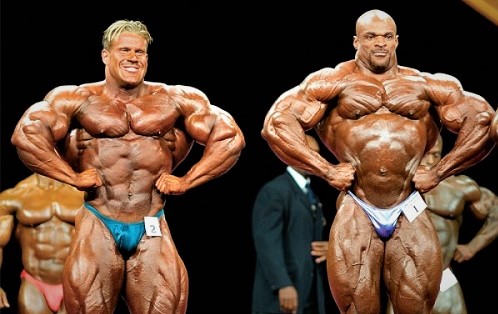
And you came and watched me train and interviewed me every year. You know my mindset. Was it that I wanted to win the Mr. Olympia or did I want to beat Ronnie Coleman? I noticed as my career went on and Ronnie stepped away, I wasn’t as motivated as before. So, I think my whole career was about beating the one guy that I just couldn’t overcome, until I did, and I think I got lost a little bit in that.
But the second-place finishes show consistency. And I was very rewarded for that. I had a huge fan following. I compare that to the current era. There’s no one right now that’s consistently second to the same guy. The last guy was Kai Greene, and look at his popularity. You can’t chase the Ronnie and Jay era. It won’t be repeated. I just don’t see that consistency between two guys. I feel blessed to be part of it. I realize how important in my life it was to have that challenge because it set me up for the huge successes I’ve had off the stage.
For most of your competitive career, the magazines were dominant. They told the stories. Now everyone gets their own story out on social media. What are your thoughts about how bodybuilding is or isn’t covered today?
When I was training for competitions, there was just so much more of a thrill to getting ready for a bodybuilding show, and remember we didn’t have any other divisions, so there was no talk of anything other than who’s competing as a bodybuilder. And there was this mystique about how is this guy going to look. And, unfortunately, today—and fortunately, at the same time, for the fans—you can kind of see, if guys are active on social, how they’re looking or what their mindset is. Before, with the magazines and what Joe Weider created, there was this mystique around all the guys. What was really cool was he [Weider] made everyone out to be a superstar based on how the articles were written.
Now, anyone can be their own author on social media, but it’s never as deep and as intriguing as what a professional writer could do. There was just so much more of an aura around guys. People wanted to know more, and you gave enough but never enough that people weren’t intrigued. And that’s what built guys up so much. Now with social media, you almost get to know too much. To me, it’s a little different feel. It’s less of a movie, if that makes any sense.
And, as for contests, now anyone can shoot with an iPhone and blast it on the internet. We used to have the best photographers with the best lenses, and the magazines only released the best images. That’s when you really started to see things fall apart with the judgmental things about bodybuilding—when the cheaper, amateur images started showing up on the internet, and guys would pick the image where someone looks their worst. There are so many great things about the internet, but there’s so many bad things, too. Now you see guys portrayed in the worst light possible, whereas before you didn’t have that. And I think that’s affected how people perceive our business. I was a magazine guy who moved over to social media, and I think you can utilize social greatly, but there’s not as much excitement. There’s no buildup of characters, because no one’s building them up anymore. You have to build yourself or you’re just not relevant.
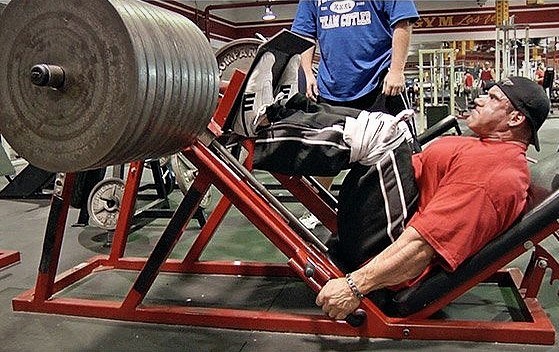
For the first time since 1984, we’ve had three different guys win the last three Olympias. Is it good for fan interest to not have a dominant champ and keep things changing, or, as Arnold recently said, does bodybuilding need a superstar and it’s lacking one now?
Bodybuilding needs a superstar or superstars. And it’s still questionable who’s the greatest bodybuilder on the planet right now, especially after an Olympia like this one [2019] where the top guys weren’t in it. You don’t have to be Mr. Olympia to be the superstar of the sport, and I think I was a little proof of that because before I was Mr. Olympia I was pretty damn popular. And I was winning Arnolds. I was winning other shows. We’ve had two guys the last two years that weren’t the most popular guys that became champions [Shawn Rhoden, Brandon Curry]. And you’re missing the two most popular guys, Phil Heath and Kai Greene. So, if you asked who’s the greatest competing bodybuilder in the world, it’s Brandon Curry because he proved it on the stage this year. But the greatest bodybuilder in the world? It’d be between Kai Greene, Phil Heath, and Big Ramy, and none of those guys were on the stage this past September.
Was Ronnie the superstar of the era? In his own way, but I was a guy who made it much easier for him to be a superstar because he had someone breathing down his neck, so there was something to talk about. If it was just him by himself, I don’t think he would’ve been as popular, because Ronnie never got out there and spoke a lot. Ronnie was known for his gym antics, whereas I was out there being the ambassador and traveling the planet, and doing all of the other stuff. Absolutely, bodybuilding needs a superstar, just like the UFC has Conor McGregor, even though he’s not the best fighter on the planet. And boxing has Floyd Mayweather, even though he hasn’t fought anyone good in how many years? A superstar, like Arnold was talking about, is someone who can pull fans in, capture the public imagination, inspire the next generation of bodybuilders.
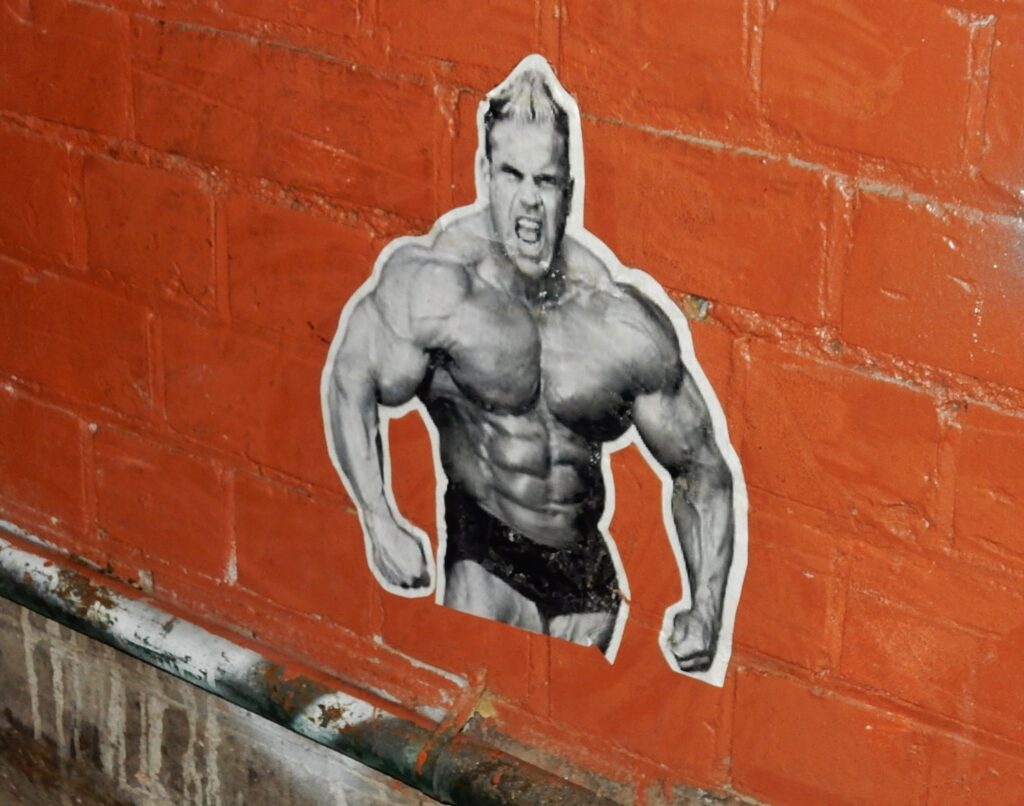
You seem like a very different person today than you were when you were competing. How have you changed?
I feel like I’ve grown a lot as a person. I’m a better-rounded person, just because I’m less focused on that one goal of winning the Olympia every year. I’m much more vocal. I can speak freely. I’m more giving, and I think I have a lot more to give because I’ve done a lot of introspection on my career and my life. But, I’ll tell you, I’ve had to talk myself into having more fun.
To competitors, I always talk about putting yourself in a less stressful environment. I talk about this boxy lifestyle. You came into my box. You watched me train, and you watched me live. It was by choice that I was so robotic back then. You can’t put yourself in so many different arenas and have so much craziness going on in your life and be your best onstage. The introverts did better—the people who were able to live that very secluded life, like Ronnie and before that Dorian [Yates]. For those 12 or 16 weeks before a show, it’s a very boxy lifestyle. Your life is like four or five steps daily, and that’s what you do, again and again and again. Anything else is going to take away from that.
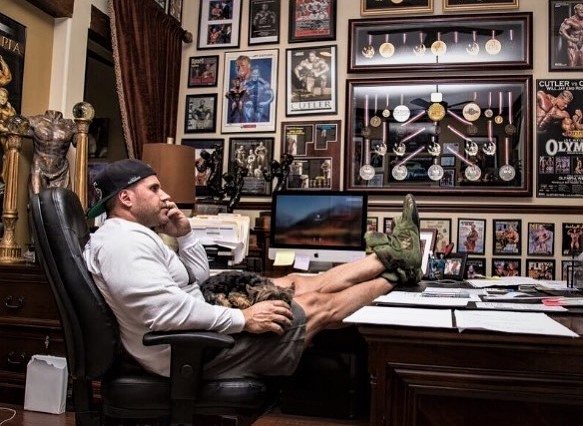
And, today, it’s harder, because the magazine contracts are gone. People have to put out their own content and travel and still stay on-point all the time. And that’s why you can have a YouTube bodybuilder who doesn’t have to think about competing, putting fun stuff out there all the time, and having two million followers, whereas if you want to be a successful competitive bodybuilder you need to get into a monotonous rhythm, and that won’t make for the best content. But you have to do what it takes to be great at what we do onstage.
That’s been the hardest part of my transition out. I was in that routine from age 18 to 40, and I had to make that transition. I’d wake up every morning and go, “Jay, you’re not who you used to be anymore. Time to enjoy your life.” But I’m still an ambassador. I still have to portray a certain part. I still train, even though I go a lot lighter. I still eat clean for my health. But I find myself saying I don’t have to live that same way. I can go enjoy things now. It’s taken me years to come to that new mindset, to enjoy traveling the world and experiencing new things. But I still will go to the Olympia and catch myself training harder, getting back in that old mindset again. That just shows you what a fan of bodybuilding I am. It’s who I am, and who I’ll always be. I just love the lifestyle.
To read about Jay Cutler’s second of four Mr. Olympia wins, check out: The 2007 Mr. Olympia
